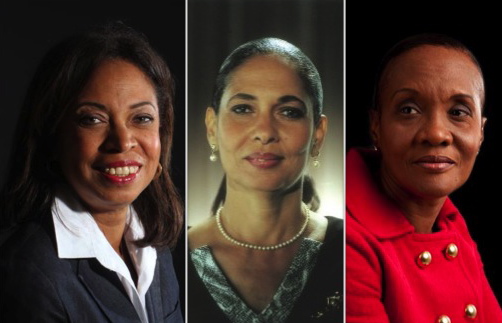Above: MPs Sharon Ffolkes-Abrahams, Shahine Robinson and Denise Daley
By Marcia Forbes, PhD
CJ Contributor
In the recently-concluded December 2011 national elections the two major political parties in Jamaica, the People’s National Party (PNP) and the Jamaica Labour Party (JLP), fielded a total of 19 women, six by the PNP and 13 by the JLP. At the end of vote-counting five of the PNP’s six have been victorious. This includes the party leader Portia Simpson Miller. Only three of the JLP’s 13 will take a seat in Parliament. Interestingly these three, all very close to or over 60 years of age, are seasoned politicians. They’ve won their seats before. None of the new “young” women in the JLP made it through.
Context is everything, though. The performance of the 19 women must be analysed against a backdrop of a massive landslide victory for the PNP not anticipated by many, and very low voter turnout of about 47 percent. Of the six PNP candidates, three were sitting members of parliament (Simpson Miller, Hanna, Neita-Headley). Three (Daley, Ffolkes-Abrahams, Philips) were brand new to the process. Daley could be seen as having been handed a “safe seat.” She went up against Hay-Webster, her former colleague and mentor who, having won that constituency for several years, only weeks before the elections and after sitting as an independent MP for some months, crossed the floor of parliament in support of the JLP. What of the other two new PNP female candidates?
Philips, a young woman, was put up against the wily, crafty old JLP politician, Karl Samuda, who has won that constituency for more times than many can remember. He did so even when he fell out with the JLP and switched to the PNP. He continued winning when he returned to the JLP. No one expected Philips to win and she did not. Folkes-Abrahams, recently returned to Jamaica from living overseas, reportedly had strong campaign support from former Prime Minister PJ Patterson. The St James West Central seat which she won was always “shaky” for the JLP’s Clive Mullings, originally a PNP supporter who switched to the JLP. PJ Patterson would know this. He seems to have worked Mullings’s weaknesses to maximum advantage for Folkes-Abrahams.
Women now comprise about 12 percent of the PNP’s 41 seats in Parliament (seat count could increase/decrease after recounts and possible challenges through the court). For the JLP with only 22 seats, women account for approximately 15 percent. Coming back to the 13 fielded by the JLP, what went wrong for most of them? They came to the national elections on a strong tide of anti-JLP sentiment fuelled by charges of botched handling of the Dudus extradition, exposure of gross mismanagement of the Jamaica Development Infrastructure Programme (JDIP – a mega-million dollar loan from the Chinese for infrastructure strengthening and which will have to be repaid), coupled with issues of race and class which we in Jamaica continue to ignore or undervalue to our peril. Derogatory racist and classist comments about some of the JLP female candidates were replete on social media.
More than half (7) of the JLP’s 13 females were new to running as constituency candidates. In the face of a speedily-called election by a brand new Prime Minister with little time for on the ground work by these women and against a backdrop of the aforementioned conditions, it is not surprising that they did not win their seats.
Before we begin to position these women and their PNP colleague as “losers” let us take the time to understand what really went down in these elections. At least six male Ministers, senior and junior ones, lost their seats. The JLP women who were there prior to the addition of the recent ones all won their seats. Olivia “Babsy” Grange and Shahine Robinson, former Cabinet Ministers, as well as Marissa Dalrymple-Philibert, former Speaker of the House, have retained their seats. This must say something about the ability of women in politics and certainly, too the fact that five out of the six female candidates fielded by the PNP won their seats.
It’s all part of the movement represented by The 51% Coalition – Development and Empowerment Through Equity, which promotes the coming together of women’s organizations and women in our individual capacity to advocate for the effective implementation of the National Policy on Gender Equality (NPGE) and specifically for legislative quotas to advance women’s participation in decision-making. The Coalition calls for adherence to the principle of the 60:40 quota, that is, no more than 60 and no less than 40 per cent of either sex, and for this to be immediately applied to the selection of Senators and to appointments to public sector Boards and Commissions.
Dr Marcia Forbes is a media specialist, the co-owner of multimedia production company Phase 3 Productions, Ltd and former Permanent Secretary in Jamaica’s Ministry of Mining and Telecommunications and later the Ministry of Energy and Mining. She is the author of Music, Media & Adolescent Sexuality in Jamaica and the upcoming Streaming: Social Media, Mobile Lifestyles.
